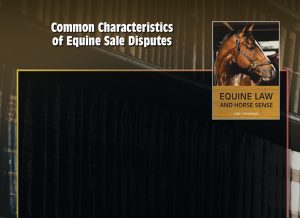Common Characteristics of Equine Sale Disputes
Click here to read the complete article
118 – May/June, 2022
 By Julie I. Fershtman, Attorney at Law · www.equinelaw.net
By Julie I. Fershtman, Attorney at Law · www.equinelaw.net
Equine sales are on the upswing these days, and many believe we’re now in a seller’s market, with high prices and eager buyers. As a busy lawyer with over 35 years of experience, my phone rings frequently with calls from horse buyers or sellers who are considering a lawsuit or who have been threatened with one. Based on these inquiries, here are five common characteristics of equine sale disputes:
1. Buyers purchase horses sight unseen. Thanks to a robust online marketplace, sellers have numerous opportunities to reach buyers–social media, online auctions, horse purchase/sale websites, and others. The problem is, buyers sometimes fall in love with photos and videos without inquiring about important details. For all you know, the beautifully trained, well-mannered horse on the video might actually have been worked for hours or even drugged to appear that way. Also, there may be a reason the buyer has situated other horses near the horse on the sale video–the horse might have major separation anxiety.
2. Buyers don’t demand evidence of past veterinary attention. Buyers, especially those on a limited budget, have every incentive to demand the horse’s veterinary history. The horse within your budget that appears sound today may have received a series of expensive and extensive joint injections a couple of weeks ago–all of which need to be repeated regularly. Buyers can ask for the horse’s veterinary history, request to receive records directly from the seller’s veterinarians, and/or confirm the history directly in the contract.
3. Buyers waive pre-purchase veterinary evaluations and seek no drug screens, only to discover serious health issues later. Your investment in a pre-purchase veterinary examination from an independent veterinarian (not one hand-picked by the seller) could help avoid a legal dispute. A drug screen can be important, as well. If you can’t attend the veterinary exam in person, look into having somebody video it as it occurs, allowing you to watch in real time or later. Also, consider hiring your local veterinarian to review the radiographs and even the pre-purchase exam video for a second opinion.
Click here to read the complete article
118 – May/June, 2022










